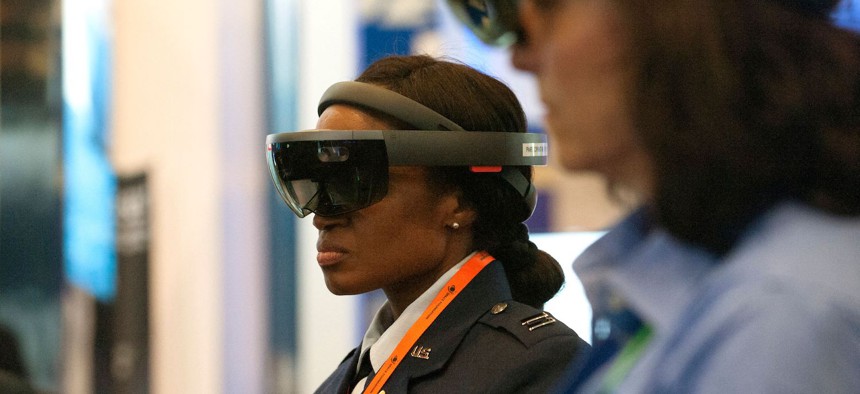RTX moves away from competing as a prime for space contracts

In this 2019 photo, attendees participate in an Augmented Reality demonstration hosted by Raytheon during the 35th Space Symposium in Colorado Springs, Colorado. JASON CONNOLLY / AFP via Getty Images
RTX's soon-to-be CEO tells investors the company will turn its focus to "the key components that go in the prime satellites and buses.”
RTX doesn’t plan on competing to build satellites as a prime contractor, but instead will focus on supplying components to other companies.
The company is “going to be shifting away from perhaps being a space prime to being more of a component supplier,” RTX President and Chief Operating Officer Chris Calio said during the company’s first-quarter earnings call today.
“I think when you look at our strengths in that portfolio, I think that pivot is the right one. We've got historical strength in some of the exquisite space areas. We've got some other strengths in some of the key components that go in the prime satellites and buses,” said Calio, who is set to replace Greg Hayes as CEO next month.
RTX’s erstwhile ambitions to lead satellite efforts drove its $350 million acquisition of smallsat maker Blue Canyon Technologies in 2020. But more recently, RTX officials have signaled that they don’t plan on competing as a prime provider of fully integrated satellites.
The company has been largely unsuccessful in competing to build satellites for the Space Development Agency’s Proliferated Warfighter Space Architecture, or PWSA. It was awarded a $250 million contract in 2023 to build seven missile-tracking satellites for the Space Development Agency, but withdrew after concluding that it could not make sufficient profit under its fixed-price contract with SDA.
“Raytheon, through executing that, realized that the scope that they had chosen and the price point wasn't wasn't going to close for that, and so we de-scoped the actual flight of those payloads, so those seven satellites are not going to fly,” SDA director Derek Tournear told reporters during Space Symposium earlier this month.
The RTX satellites were added “as a fifth plane” of the constellation after Congress increased SDA’s 2023 budget, Tournear said. The minimum viable product for Tracking Layer Tranche 1, made up of 28 satellites built by Northrop Grumman and L3Harris, will still be delivered, he said.
“There's a lot of the components that are being developed on that Tranche 1 Tracking Raytheon contract that are flowing into some of the Tranche 2 vendors, and so we're continuing that work, but the flight of those satellites is no longer going to happen,” Tournear said.


